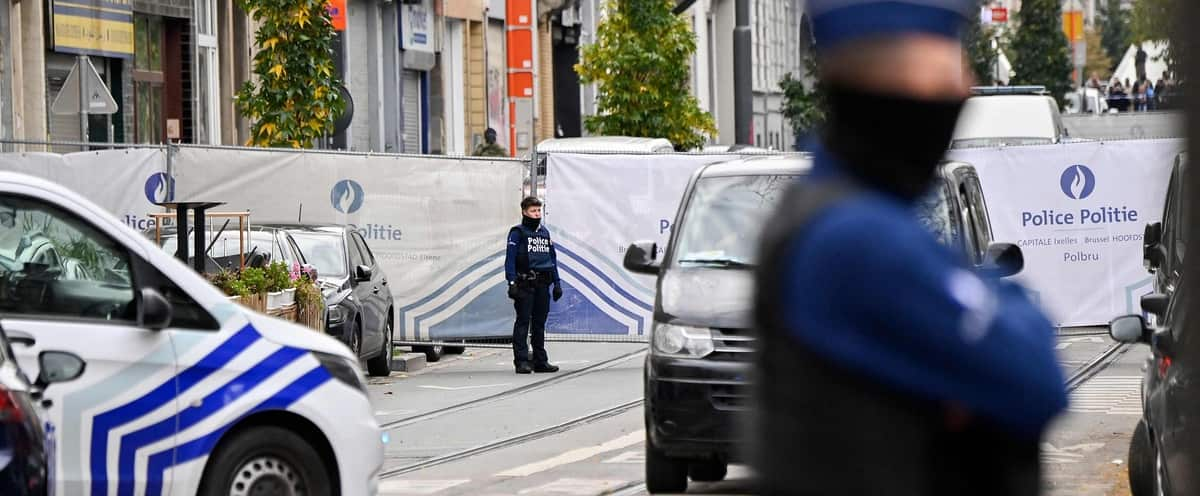The man suspected of killing two Swedes in an attack in Brussels on Monday evening was a Tunisian who was in Belgium illegally, known to police but not on the list of radicalized people and who claimed to be ready , “to make sacrifices” for the Koran.
• Also read: With the attack in Brussels, Sweden’s worst fears have come true
• Also read: The suspected perpetrator of the Brussels attack is dead
• Also read: Terrorist attack in Brussels, two Swedes killed, gunman on the run
Abdesalem Lassoued was fatally injured when he was arrested by police on Tuesday morning at a cafe in the Brussels municipality of Schaerbeek, where a building had been searched overnight.
Here’s what we know.
A person known to the police
The 45-year-old Tunisian, whose asylum application was rejected in Belgium, was known to the police “for suspicious acts of human trafficking, illegal residence and endangering state security,” said Justice Minister Vincent Van Quickenborne.
The minister pointed out that in July 2016 “unconfirmed information was transmitted by a foreign police service that the man had a radicalized profile and wanted to travel to a conflict zone for jihad.”
He stressed that back then, shortly after the attacks of March 22, 2016, which killed 35 people at Zaventem airport and in the Brussels subway, “this type of information and notification was legion.”
The minister added that the Belgian services had carried out a verification of this information but that no action had been taken, without giving further details.
Not on the radicalized list
“As far as our services know, there was no concrete information about radicalization, which is why this person was not included on the OCAM list,” which lists people identified as “extremists” who are likely to resort to violence, he said .
Earlier this year, the man was reported to police by a resident of a shelter in Antwerp province, who claimed that the suspect had threatened him and that he had been convicted of terrorism in Tunisia.
On this subject, the Federal Criminal Police in Antwerp has even convened a meeting this Tuesday of the “Joint Information Center”, a structure created after the March 2016 attacks to monitor terrorism cases.
Meanwhile, the Belgian services had “received information that the man had not been convicted of terrorism in Tunisia, but of common law crimes,” said Vincent Van Quickenborne, for whom the Antwerp police action was “more of a precautionary measure” because “ There was no talk of a specific or imminent terrorist threat.”
Sweden in sight
The suspect followed Swedish fans who had gotten into a taxi at around 7:00 p.m. (5:00 p.m. GMT) on Monday evening, shortly before the Belgium-Sweden game at the King Baudouin Stadium. He “opened fire on these people who got out of the taxi and even went so far as to chase them into a building,” described federal prosecutor Frédéric Van Leeuw. According to the Belgian authorities, he probably acted alone and without a network.
The two dead were a Swedish woman and a person who may have dual Swiss and Swedish citizenship as she also had a Swiss identity card, the prosecutor said, adding that a Swede was also injured.
A protest video message was posted on social media by a man who identified himself as the attacker and said he was inspired by the Islamic State group and said he had killed three Swedes.
The prosecutor specified that “in another video recorded before the attack, the same person is seen wearing a hood and declaring that ‘the Book of Allah is a red line for which he makes sacrifices’.”
Sweden, whose image has significantly deteriorated in the Muslim world this summer after several Koran desecrations approved on its territory, decided on August 17 to raise the terrorist alert level, believing that the threat of attacks “will continue for a long time will stop”.
Swedish intelligence said the man had been in Sweden for a “short time” “ten years ago.”
Illegal alien
The alleged perpetrator initiated an asylum procedure in Belgium in November 2019, but received a negative decision in October 2020, according to Nicole de Moor, State Secretary for Asylum and Migration.
She added that he was “deleted from the national register” on February 12, 2021 and therefore cannot be traced for return to his country of origin. “For this reason, the order to leave the territory established in March 2021 could never be issued,” the official said.

